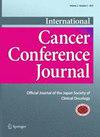FGFR2融合基因阳性的肝内胆管癌对培咪嗪尼有反应并引起低磷血症。
IF 0.5
Q4 ONCOLOGY
International Cancer Conference Journal
Pub Date : 2023-07-03
eCollection Date: 2023-10-01
DOI:10.1007/s13691-023-00619-5
引用次数: 0
摘要
肝内胆管癌是一种预后较差的疾病。传统上,除非吉西他滨、顺铂和替加富尔/吉美拉西/尿嘧啶钾等重要药物显示出疗效,否则无法治愈。Pemiginib最近已可用于治疗FGFR2融合或重排基因异常的肝内胆管癌。高磷酸盐血症通常与培伐替尼有关。在目前的病例中,pemiganib被用于有效治疗一名48岁的妇女,并观察到低磷血症。肝内胆管癌患者应接受侵袭性癌症多基因小组测试,并仔细监测血清磷水平。本文章由计算机程序翻译,如有差异,请以英文原文为准。
Intrahepatic cholangiocarcinoma with FGFR2 fusion gene positive that responded to pemigatinib and caused hypophosphatemia.
Intrahepatic cholangiocarcinoma is a condition with a poor prognosis. Traditionally, there was no cure unless important drugs such as gemcitabine, cisplatin, and tegafur/gimeracil/uracil potassium showed efficacy. Pemigatinib has recently become accessible for the treatment of intrahepatic cholangiocarcinoma with FGFR2 fusion or rearrangement gene abnormalities. Hyperphosphatemia is typically linked to pemigatinib. In the current case, pemigatinib was used to effectively treat a 48-year-old woman, and hypophosphatemia was observed. Patients with intrahepatic cholangiocarcinoma should undergo aggressive cancer multigene panel testing as well as careful monitoring of serum phosphorus levels.
求助全文
通过发布文献求助,成功后即可免费获取论文全文。
去求助
来源期刊

International Cancer Conference Journal
ONCOLOGY-
自引率
14.30%
发文量
57
期刊介绍:
This online-only journal publishes original case reports on all types of cancer. In particular, we welcome not only case reports of educational value in the diagnosis and treatment of cancers, but also reports on molecularly analyzed cancer cases, including gene mutations, gene fusions, gene expression, and changes in copy number, regardless of their known clinical significance. Assessing the molecular analysis of a tumor usually requires a “cancer conference” in which experts from various fields discuss it. Even if the authors and their respective “cancer conference” were unable to determine the clinical significance of molecular changes at the time of submission and publication, their data may provide evidence that will help the scientific community develop precision medicine solutions in the future. We welcome case reports with reviews of the literature on similar cases, as they are more useful and valuable to readers than are reports of rare cases. International Cancer Conference Journal is the official publication of the Japan Society of Clinical Oncology (JSCO).
- Presents an online-only collection of original case reports on all types of cancer
- In particular, welcomes molecularly analyzed cancer cases
- The Official Publication of the Japan Society of Clinical Oncology (JSCO)
 求助内容:
求助内容: 应助结果提醒方式:
应助结果提醒方式:


